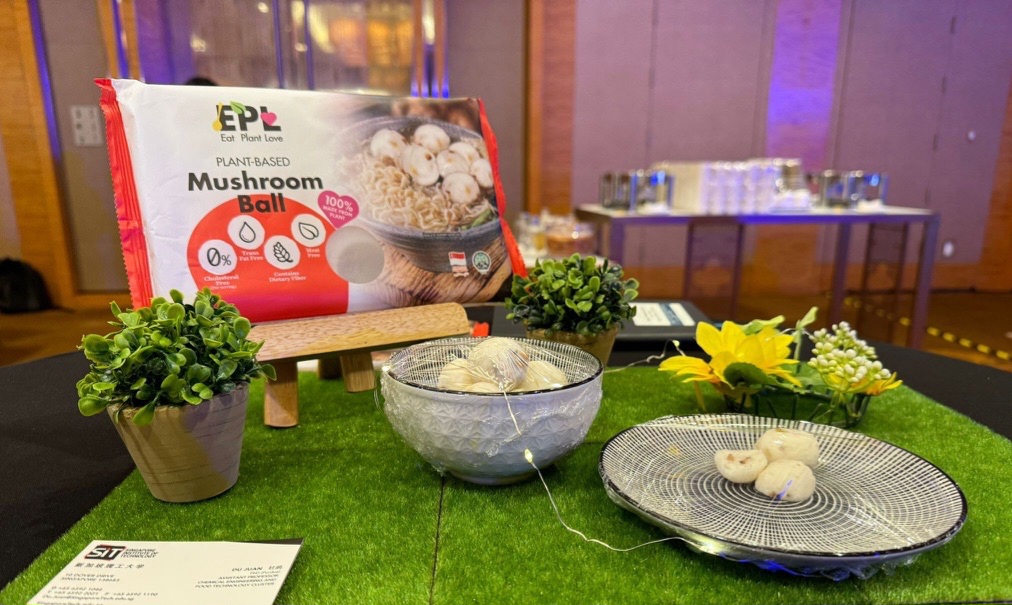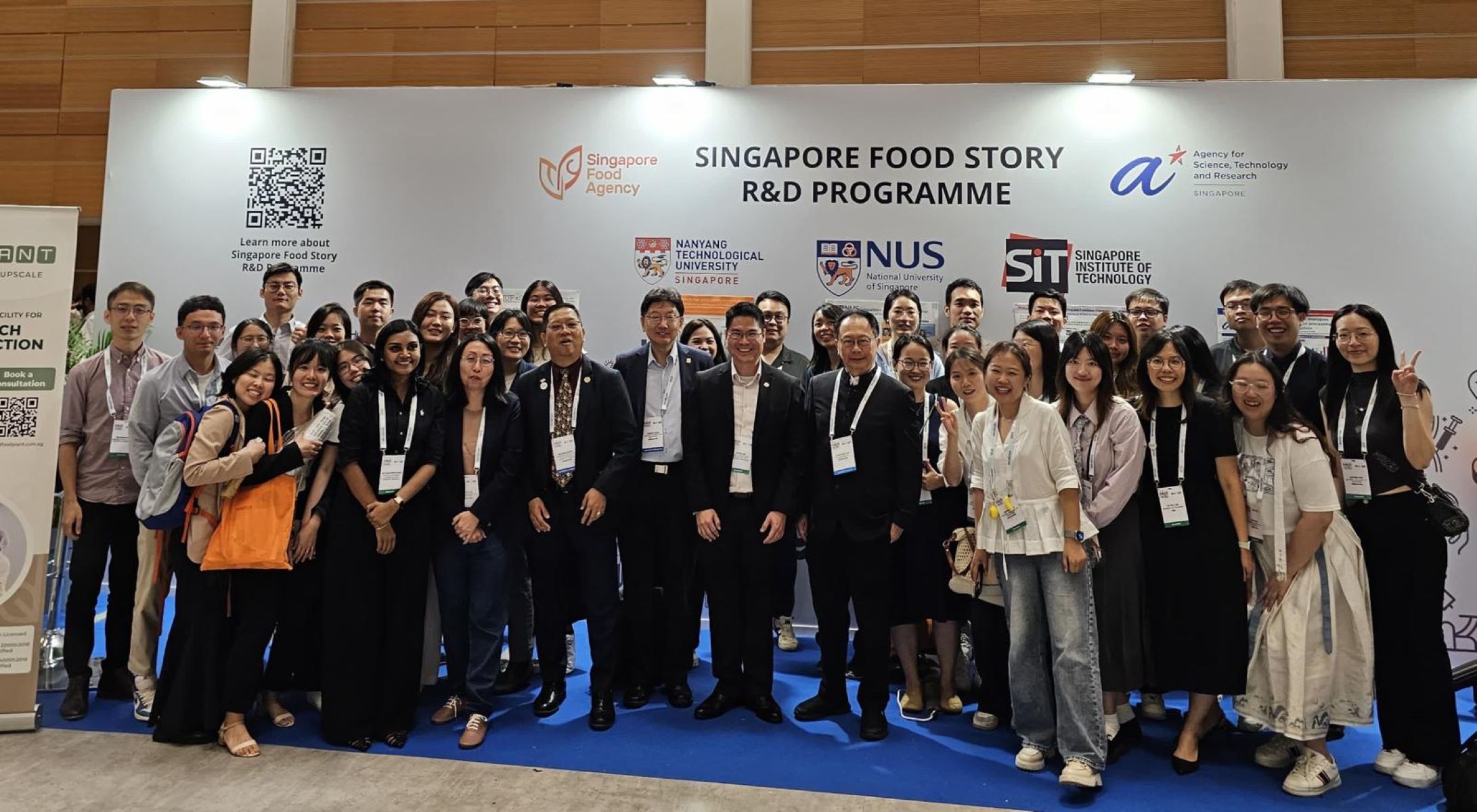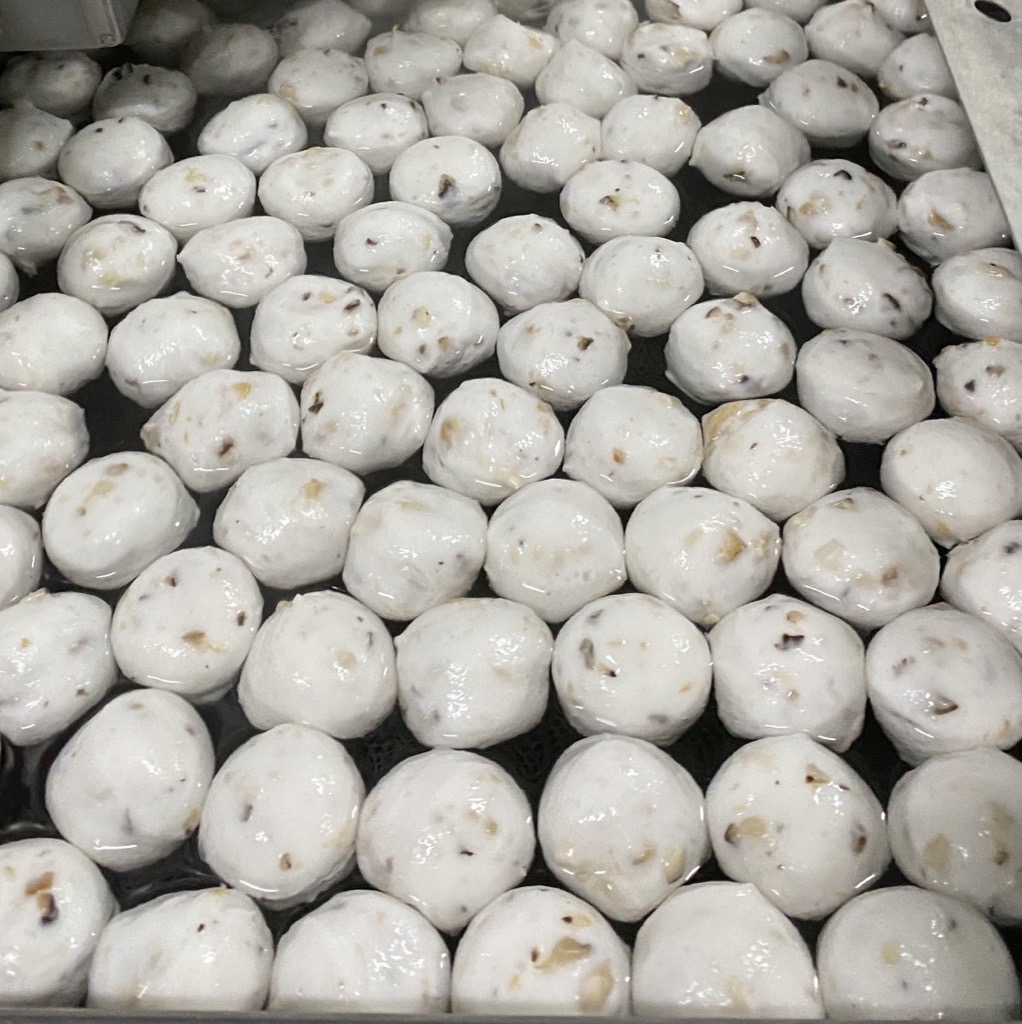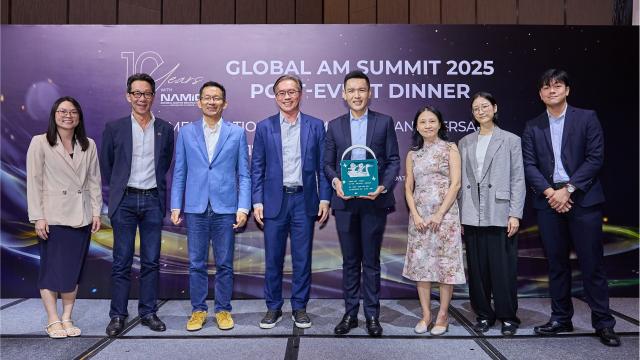The ProScreen programme tackles food security challenges through automated protein analysis, turning plant-based ingredients into market-ready products.
Among Singapore’s array of hawker favourites is a comforting bowl of fish ball noodles. The local delight, comprising savoury broth and springy noodles, evokes a familiar sensory experience. The centrepiece of this culinary creation is, of course, the bouncy, tender fish balls. But what if you could enjoy fish balls that are not only delicious, but also healthier, more nutritious, and sustainably made without compromising on taste?
Associate Professor Du Juan and her team at SIT’s Food, Chemical and Biotechnology Cluster have contributed to support the launching of a healthier version of plant-based fishball. Working with Ha Li Fa, the local company behind the popular BoBo fish balls, the team helped produce the “Mushroom Magic” fish balls under the plant-based brand EatPlantLove.

The "Mushroom Magic" fish balls, created through a collaboration between SIT’s research team and Ha Li Fa, offer a delicious, sustainable alternative to traditional seafood. (Photo: SIT)
The product has been retailing at both online and offline platforms since September 2022 and meets Singapore’s Healthier Choice requirements with reduced sodium making it a healthier option.
But this is just the beginning for A/Prof Du and her team. Drawing from her experience as an associate scientist in food companies, she has witnessed first-hand the challenges confronting the industry. “A major issue faced by the food industry is the taste and texture to meet consumers’ needs, with current limited selections of the food proteins, we need a tool to screen and select the suitable novel food proteins to deliver the taste and nutrition needs in plant-based materials” she explained.
Each protein source behaves differently during food processing. Without proper characterisation tools, companies often resort to trial-and-error testing – an inefficient and resource-intensive approach that slows innovation.
As global concerns over food security intensify, there is a need for advanced tools that can accurately analyse the structural and functional properties of proteins. This is a crucial step towards developing alternative proteins, especially as the world’s population is expected to grow by 40 per cent by 2050, placing pressure on traditional animal agriculture and its use of land and water resources.
For Singapore, a land-scarce city-state that imports over 90 per cent of its food, developing local and sustainable protein sources is paramount.
Automating Protein Analysis
To address Singapore’s food security challenges, the ProScreen research project was initiated. A collaboration between the Agency for Science, Technology and Research (A*STAR), National University of Singapore, Massey University of New Zealand, and SIT, the project aims to characterise protein functionality in alternative protein development efficiently. This refers to identifying how specific proteins behave to gauge their performance in food applications such as texture, flavour, and nutritional value.
Traditional methods are labour-intensive, expensive, and time-consuming. “The keyword is automation,” said A/Prof Du.
The technology used involves an elaborate set-up in a high-tech laboratory – robotic arms load samples into various testing equipment that analyse properties like gelling capacity, foaming ability, and texture. But the impact is transformative: Tests that traditionally take one to two months can now be completed in a week, with machines working around the clock. It is Singapore’s first automated protein screening and functional characterisation platform.
Robots and smart machines working together to prepare, test, and analyse protein samples — making the process faster, easier, and more accurate. (Images below: SIT)

(left image) Automated Rheometer (Anton Paar MCR): This machine tests the physical flow properties of protein samples, helping researchers understand how proteins behave under stress.
(centre image) Foam Analyser: Used to measure how stable protein foams are — important for applications like food, cosmetics, and pharmaceuticals.
(right image) Automated Liquid Handling System (SIT's setup with robotic arm): This robot prepares and moves protein samples between different testing stations, reducing manual work and ensuring precision.
ProScreen aligns with SIT’s commitment to applied learning and translational research, where innovations are co-developed with industry to bring ideas to market. As part of SIT’s focus on future food research, this project supports the development of nutritious, sustainable food solutions for an ageing population while contributing to Singapore’s long-term food resilience under the Singapore Food Story.

Team Singapore at International Union of Food Science and Technology 2024! Showcasing the Singapore Food Story R&D Programme — a national effort led by Singapore Food Agency and A*STAR, with strong contributions from SIT, NTU, NUS, and industry partners to advance food resilience through innovation in alternative proteins, aquaculture, urban farming, and food safety. (Photo: SIT)
By co-developing scalable, sustainable solutions with industry, SIT plays a pivotal role in advancing food innovation that meets the evolving needs of both local and global communities, supporting healthier diets, reducing environmental impact, and contributing to a resilient food ecosystem.
Balancing Competing Priorities
Developing successful alternative proteins requires balancing nutrition, taste, texture, sustainability, and cost. One of the major hurdles for plant-based proteins is what A/Prof Du calls the “beany” taste or bitter flavours common in legume-based ingredients.

A pilot trial of fish balls formulated with alternative proteins was conducted to evaluatetexture, bounce, and cooking performance. (Photo: SIT)
Texture presents another challenge. “The second major complaint from consumers regarding plant-based food is that the texture is not good enough or close enough to meat products,” she said. Conventional solutions to tackle these issues involve adding hydrocolloids, or food additives, to improve texture. SIT’s applied research addresses these challenges by food formulation technology to optimise the use of food ingredients that reduced the sodium levels suitable for HCS to make them consumer appeal. Another version of high in fibre product is currently under the evaluation with collaborator.
Beyond Meat Replacement
These considerations are important because the consumer market is highly discerning and competitive, with customers’ taste buds deciding the fate of food products.
Unlike other alternative protein start-ups focused on mimicking meat, ProScreen’s approach is more nuanced. “We are not trying to make plant-based foods taste like meat; rather, we are making plant-based foods taste delicious as they are,” said A/Prof Du.
She points to traditional Asian foods like tofu and tempeh: “We eat tofu not because it tastes like meat, but because it’s a good source of protein.”
This culturally attuned and health-conscious approach reflects SIT’s values of applied learning and relevance, where food innovation is not only about substituting but creating new value for diverse nutritional needs.
Therefore, the next frontier of alternative proteins may not centre on mock meats. Besides fish balls, ProScreen supports various food companies in developing high-protein ice cream, whipped cream for culinary applications, and breads with reduced glycemic index, which are particularly relevant for diabetics. By incorporating dairy and whey proteins and applying advanced food science relevant for diabetics, SIT’s research project enables the creation of softer-textured foods that maintain nutritional value, tailored to Singapore’s ageing population.
By translating science into scalable products, ProScreen exemplifies SIT’s commitment to building a resilient and future-ready food ecosystem that is inclusive, sustainable, and aligned with Singapore’s broader food security agenda. The team is looking forward to the next phase of development: further reducing environmental impact and improving the taste of plant proteins to make them more accessible, especially for consumers with dietary restrictions.
Soon, perhaps, Singaporeans will enjoy not just meat substitutes, but a new generation of functional, flavourful foods – like nutritious high-protein ice cream and sustainable plant-based crustacean for seafood lovers thanks to the team’s mission to shape the future of food.















![[FA] SIT One SITizen Alumni Initiative_Web banner_1244px x 688px.jpg](/openhouse2025/directory/openhouse/centre-professional-communication/centre-professional-communication/centre-professional-communication/directory/sites/default/files/2024-12/%5BFA%5D%20%20SIT%20One%20SITizen%20Alumni%20Initiative_Web%20banner_1244px%20x%20688px.jpg)


